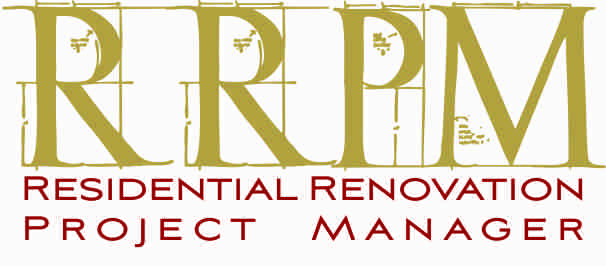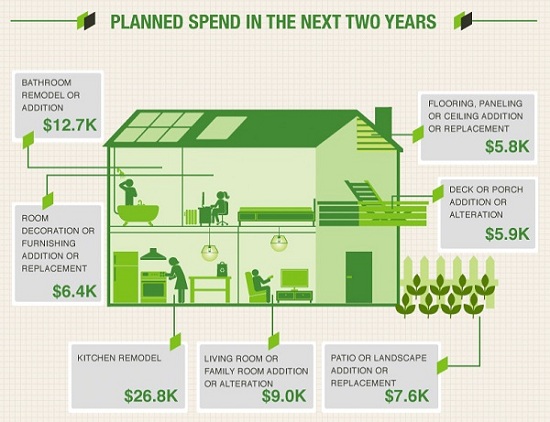
Have you ever wondered why seemingly great designers and qualified builders run into so many on-site problems when the solution seems so obvious to you? Have you always had a yearning to manage a renovation project for your client because you know you can do a much better job?
I am sure you have heard horror stories about someone’s disastrous renovation, or watched a DIY renovation show that invariably has the same dismal ending; a major problem was uncovered during the renovation, the homeowner was asked to; spend more money, forfeit part of the renovation, live with the consequences or sold their property below market value!
The step two component of the scope of work stager’s are now working on is way beyond cleaning. clearing, packing and repairing. Today’s condition items can include total renovation of Kitchens. Bathrooms and back yards. If you are involved in this type of work before or after showcasing this program is for you.
Consider applying your project management skills, knowledge, organization and passion you already have to manage your client’s renovation projects and increase your earning potential. Attend this seminar to learn the systematic and thorough process to follow for each component of a renovation project, the pitfalls to avoid and the questions to ask!.
It all begins with Phase 1 – Assessing the Renovation and Understanding the Scope of Work through to Phase 3 –-The 10 Steps to a Successful Renovation of you inspecting the contractors work on site. This is no different than you looking at a property prior to agreeing to completing a home staging job to showcasing the house and handing it back to the owner and Realtor for resale.
Click to listen to the live recording Q & A with Deb Boucher on managing home renovations
(To save the file, right click on the link and select Save Target or Save As)
If Windows Media Player or your Media player of choice is having problems playing a video you may need the correct codec.
Click here to download the gotomeeting video codec.
Click to read an article by RRPM graduate Emma Lee Arsenault

Participants Will Learn:
Phase #1 – Assessing the Renovation and Understanding the Scope of Work:
- Participants will work through a House Assessment Worksheet prior to planning a renovation project to identify possible problems that will affect the success of the renovation, the design, budget and duration
- What to look for and why? The following topics will be discussed, participants will consider options and evaluate “and if you don’t” the adverse effects it could have on the home and the renovation
- Occupant health
- Energy efficiency
- Resource efficiency
- Environmental responsibility
- Affordability
- As you plan your addition, there are important things to consider:
- Size and design
- Fixtures
- Structural problems
- Moisture
- Plumbing and electrical
- Heating and ventilation
- Finishes
- Zoning and regulations
- Upon completion of the worksheet and the webinar you will be able to identify the skills your contractor needs and why
Phase #2 – Checklist for Hiring a Contractor:
- Know the contractors and homeowners responsibilities and how to avoid costly mistakes. When do you compromise and when to remain firm
- Identify the skills the contractor needs for this project. There are many ways to hire and pay a contractor such as hourly, a fixed price or a cost-plus contract
- Is relying upon a friend’s referral enough credibility to hire a contractor? Learn what questions will reveal a personality to how the contractor works with his team
- Be aware of the danger signs or approach to starting the contract
- Do you know your client – are they willing to accept daily disruptions in their routines?
- The underground economy – is it better to pay cash?
- Regardless of how small the project is – detail the work and put it in writing
- How will you manage a builder’s lien, deficiency, seasonal or delivery holdback?
- Are there consumer protection laws and can they apply to your renovation?
Phase #3 – 10 Steps to a Successful Renovation
- A contract establishes the foundation for a good working relationship between you and your contractor. A detailed and clearly written contract reduces confusion and misunderstandings and it helps you both see the work the same way
- Use and discuss the Canadian Mortgage and Housing Renovation sample contract that includes:
- Contract documents, description of the work, permits, list of subcontractors and trades, terms for payment, changes in the work, access to the clients house, standards of work and performance, Worker’s Compensation compliance, dispute resolution, contractor or home owner defaults and payment
- Contract documents – what’s included in the contract (drawings, specifications, building permits to name a few)
- Description of the work – what’s included and what’s not
- Permits – what permits are required and who is responsible for obtaining them and paying for them
- List of subcontractors and trades who will be on site /when /are they insured etc.
- Timing for the different phases of completion for the project
- Terms of payment and payment schedule
- Changes in the work (on-site changes that affect the price, product availability and completion dates)
- Access to the clients house (ie. Kitchen, bathrooms, arrival and departure times)
- Standards of work
- Warranties
- Insurance
- Compliance with Workers’ Compensation and Other Laws
- Other contractors
- Dispute Resolution
- Default by owner and/or contractor
Type of Course: WEBINAR/ONLINE COURSE
Duration: 2 Sessions at 3 Hours Each
Fee: CSP Members – $449, Non CSP Members – $499
Now offered as live one day workshop. To register click here




Earn Four CE credits for the CSP International™ Masters of Real Estate Staging and the Residential Renovation Project Manager Designation
INSTRUCTOR: Debrah Boucher

Instructor Bio:
How do you go from human resources, marketing and trade show booth design and management to owning a successful interior decorating, home staging, color consulting and training business? Lots of determination, education, and construction knowledge as well a continuing to work in the industry and providing excellent customer service helps!
In the early 80’s Debrah and her husband flipped their first home that netted them a nice profit. Today the “flipping” is less frequent but they continue building, buying, renovating and selling.
In 1995 Debrah founded DB Interiors after a successful career in managing and marketing commercial trade show programs. Designing trade show properties and working with the trades in reconstructing the booths on-location gave Deb the experience and desire to follow her dreams; owning her own company, buying and selling properties and teaching.
In the early years of growth she realized she needed to add additional services to attract and maintain new clients. Deb turned to the Canadian Staging Professionals and enrolled in the first Ottawa offered, Certified Canadian Staging Professionals course and designation given by Christine Rae of the Canadian Staging Professionals. Numerous courses and additional skills were added and today Debrah is a certified instructor for the Dewey Color System, the CSP Elite and the Certified Eco Professional courses.
Training is Deb’s passion as she enjoys sharing her knowledge with the students and giving them the tools to increase their business offerings. Her students appreciate her knowledge, patience and understanding of the construction industry. Debrah offers her color courses across Canada and also teaches evenings for the Ottawa Board of Education.
In 2011-2012 she was the President of the Ottawa Real Estate Investment Organization(OREIO) and continues as an active member. It’s a great place to meet people, get new clients and continue to learn about the real estate market. Through OREIO she has met home inspectors, contractors and many people specializing in all aspects of construction. When asked what is the one most important aspect of working with contractors “knowing the project and having a contract”.














 Subscribe Today!
Subscribe Today! 

